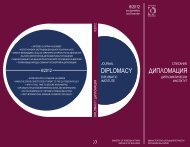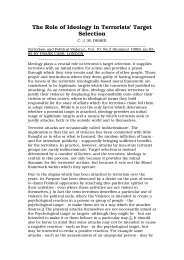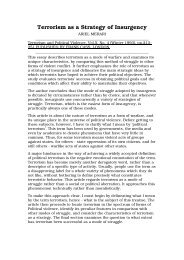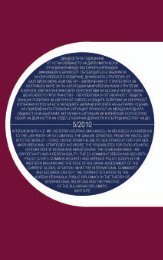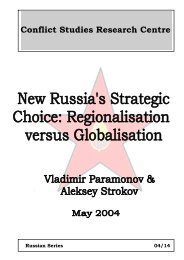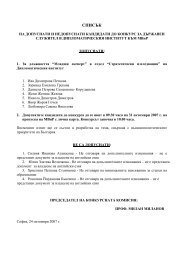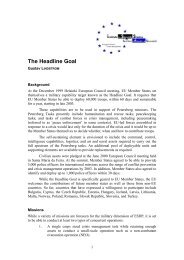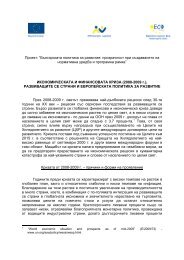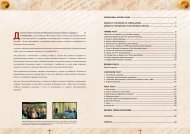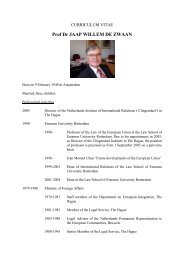The Myth of Ethnic Conflict: Chap 13 - Diplomatic Institute
The Myth of Ethnic Conflict: Chap 13 - Diplomatic Institute
The Myth of Ethnic Conflict: Chap 13 - Diplomatic Institute
Create successful ePaper yourself
Turn your PDF publications into a flip-book with our unique Google optimized e-Paper software.
500 Maria Todorova<br />
sulted in a further marginalization <strong>of</strong> the Pomaks’ territories. <strong>The</strong>re<br />
political mobilizers attempt to exploit economic grievances in an<br />
effort to transform cultural cohesiveness into political identity.<br />
Economists and policymakers are well aware <strong>of</strong> this effort, and a<br />
variety <strong>of</strong> views has been advanced to handle the problem and thus<br />
weaken those political mobilization efforts. 108 Yet even if some economic<br />
improvement is achieved (and this is unlikely), other factors<br />
are at work in transforming Pomak cultural identity into political<br />
identity and thus increasing politicized cultural tensions in Bulgaria.<br />
Indeed it is true that “at all times, and not only at moments <strong>of</strong><br />
economic crisis, collective political actors emerge who may help to<br />
determine political outcomes.” 109 Political parties and other groups<br />
exert strong pressure on the Pomak population to make its cultural<br />
identity politically relevant. <strong>The</strong>ir success in acquiring loyalties and<br />
in shaping identities obviously depends on how far they are able to<br />
meet a variety <strong>of</strong> group interests, not only economic ones. In their<br />
intricate maneuvering between what they wish to <strong>of</strong>fer and what<br />
they are able to deliver, they are caught up in a complex game within<br />
the state political sphere, which imposes limitations on them.<br />
Among these factors, international constraints and incentives are <strong>of</strong><br />
prime importance. As already indicated, the precarious geopolitical<br />
situation <strong>of</strong> the country, the new interpretations <strong>of</strong> national security<br />
which include the economy, and the explosive issue <strong>of</strong> ethnic minorities<br />
in the new international context further compound the struggle<br />
between political groups amd the search for efficient solutions to<br />
their economic and political problems.<br />
<strong>The</strong> issue <strong>of</strong> a political identity in the pursuit <strong>of</strong> group interests<br />
is a defining feature in the development <strong>of</strong> the Bulgarian Muslim<br />
population. As one researcher has put it, they are “well aware <strong>of</strong> their<br />
group distinction and are now looking for ways to explain it.” 110 This<br />
statement, however, needs some elaboration. Despite the fact that the<br />
Pomaks are usually seen and described as a compact entity by the<br />
out groups, their presumed uniformity is far from real. Precisely<br />
because they were not fully caught in the homogenizing efforts <strong>of</strong><br />
the nation-state, regionalism among them is even more pronounced<br />
than among other groups. <strong>The</strong>refore, their response to the challenges<br />
<strong>of</strong> the new economic and political climate after 1989 takes the form<br />
<strong>of</strong> a variety <strong>of</strong> group identities, rather than <strong>of</strong> a single one. Nonetheless,<br />
although there still is a part <strong>of</strong> the Pomak community which



